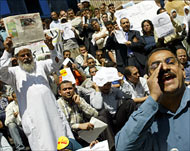Egypt council approves poll guidelines
Egypt’s upper house of parliament has approved guidelines to regulate the country’s first multi-candidate presidential elections, but opposition figures said they would exclude real competitors to President Hosni Mubarak.

The suggested constitutional amendment was approved by 241 of the 264-member advisory Shura Council in a vote called “historic” by Speaker Safwat al-Sharif, according to the Middle East News Agency.
The guidelines must now be approved by the lower house, which will review them on Tuesday.
They will later be put to a public referendum for final approval before September’s presidential polls.
“The roots of a new culture are taking hold in the soil of our country, its fruits are awaiting the spring for the democracy flowers to blossom,” al-Sharif said. “These are historic and decisive moments in the life of our nation.”
This is the first constitutional amendment passed by the upper house since its formation in 1980.
Election regulations
A parliamentary committee drafted the regulations after Mubarak, in a surprise move, ordered the constitution to be amended to allow more than one candidate to run in presidential elections.
|
“The roots of a new culture are taking hold in the soil of our country, its fruits are awaiting the spring for the democracy flowers to blossom. These are historic and decisive moments in the life of our nation” Safwat al-Sharif,Shura Council speaker |
Previously, Egyptians have cast only a yes or no vote on a sole candidate nominated by parliament every six years.
The guidelines stipulate that a presidential candidate must either be a member of an official political party or, if running as an independent, get a minimum of 65 recommendations from elected members of the lower house, 25 from the Shura council, and 10 from local councils from at least 14 governorates.
The regulations, which were first published in state-owned media on Thursday, were seen by opposition figures as putting a gag on serious contenders because all the elected bodies are dominated by Mubarak’s ruling party and its supporters.
“These regulations are utterly disappointing, totally undemocratic,” said Hamdin Sabahi, an independent lawmaker in the lower house. “We will not witness real elections but a crude soap-opera.”
State control
Sabahi, who had previously indicated he may run for president, said the new rules denied him the chance.
He has been trying to form a party but it has been rejected by the government-dominated political party committee.
 |
|
Egypt has recently been wracked |
Only “weak” political parties will have the chance to select a candidate, he said, pointing out that most Egyptians do not have much faith in political parties and are not members of one.
“Anyone who will run now will be a collaborator with the ruling party in their fraud against the will of the people,” he said. “We all – voters and candidates – should boycott the elections.”
Rifaat al-Said, a member of the leftist Tagamu party, said the amendments make it impossible for independents to run.
With the state control over media, opposition candidates have little chance, he told the Shura Council.
Egypt’s longest ruler
George Ishaq, a leading member of the Egyptian Movement for Change, known as Kifaya, said the constitutional change put “huge” barriers before candidates, adding that these conditions can only be met by Mubarak.
|
“Anyone who will run now will be a collaborator with the ruling party in their fraud against the will of the people. We all – voters and candidates – should boycott the elections” Hamdin Sabahi, independent lower house lawmaker |
“This is a masked referendum, and we fully refuse it… We still uphold our slogan ‘No more extensions. No to succession’,” Ishak said.
Mubarak has been president since 1981, running unopposed for four six-year terms, making him Egypt’s longest ruler.
His surprise decision to hold multi-candidate presidential elections was welcomed by most in Egypt, but many feared the suggested amendments would only serve to legitimise his rule.
Opposition parties say the short notice before the first-ever elections give them little time to campaign and prepare.